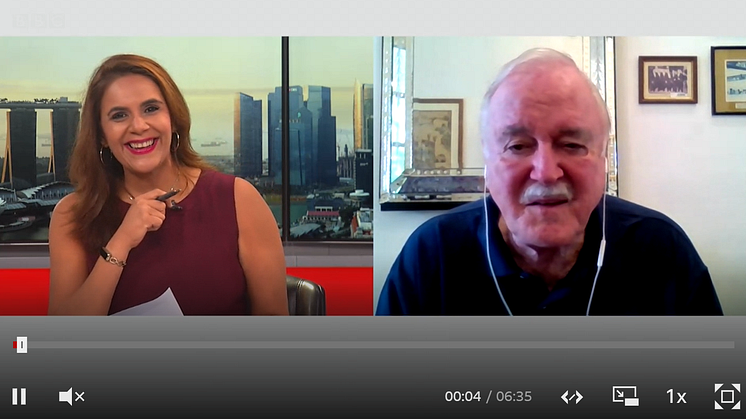
Blog post -
How to interview a comedian, how to be interviewed as a comedian
John Cleese's walk-out of his interview with Karishma Vaswani on BBC World News makes for an interesting case study in what happens when an interview goes off the rails – with some unsolicited ideas for how to avoid it.
A quick summary:
Karishma's first question – A normal, broad question to seek a direction for the interview. Serious question about cancel culture. John engages on the topic with a serious reply.
Second question – Starts with "But John, some would say…".
John objects to the use of the word "But".
Terse exchange ending with Karishma saying, "…if you would give me the opportunity to" ask her question.
Ouch!
Finally Karishma is able to get to the point, which is whether racist behaviour is acceptable as a bit of banter."
John: "I think that's a very poor question."
Karishma: "I'd like you to answer it."
Goodness. Two questions in, and already it no longer sounds like an interview with a comedian.
John engages on the topic, then ends with "I think you were going to ask me about being here in Singapore to do shows, and in Bangkok, or is that at the back of your agenda?"
Karishma: Conciliatory question about doing shows in the middle of a pandemic.
John: Engages on the timing of the shows.
Okay, interview disaster averted.
Karishma: Another conciliatory question about whether he has had to change the routine as a result of the pandemic.
John: Engages, says he hasn't written it yet. It's still three weeks away.
Good. The interview seems back on track.
Karishma: A broad conciliatory follow-up question inviting him to elaborate on his point about people not listening to each other and accepting different points of view.
John: Engages further. Makes a point about people needing to listen more to each other. Possibly the high watermark of the interview.
But then…
Karishma: Starts a question about comedian Dave Chappelle, but before she is able to finish…
John: "Oh we're back on cancel culture, I thought we were going to be talking about shows and comedy but I'm not interested in doing this interview anymore, bye bye."
John takes his earphones out and gets out of his chair, leaving Karishma to comment, "Okay, that's your prerogative".
End of interview.
I have spoken to neither Karishma nor John for this column, but here are some broad thoughts.
- When interviewing a comedian, don't try to be funny. That's the comedian's job. Karishma, you're in the clear on that point.
- When interviewing as a comedian, don't try to be serious. But if you do engage on serious topics, be prepared to be challenged. That's the journalist's job. John, what were you expecting? A free kick?
- To complain about an interview is to draw more attention to it. Just like ex-PM Najib Tun Razak's extraordinary interview with Mary Ann Jolley - which won Al Jazeera the Royal Television Society (RTS) Television Journalism "Interview of the Year" Award 2019 – walking out of an interview is bound to attract more attention than completing it, even if you are grinding your teeth.
- Comedians make poor interviews. There are really only five types of interviews with them:
- Fawning – the interviewer gushes with questions like "how do you do it?", and the inevitable "I'm just being myself" response. Cringeworthy, with no news value. Free advertising for the comedian.
- Funny – the interviewee turns the conversation into a preview of their comedy show. Hilarious, with no news value. Free advertising for the comedian.
- Advertorial – the interview is about the show being on. Boring, with no news value. Free advertising for the comedian.
- Serious – the interview is a serious discussion about a perilous topic. Thought-provoking, but with no news value. Treading the fine line between tragedy and comedy. Free advertising for the comedian.
- Walk-out – the interview is a perilous discussion about a serious topic, which the comedian breaks off early. Gobsmacking, with no news value. Free advertising for the comedian and the television station.
But maybe that was the intention, to crank up ticket sales? Why else do the interview? John said as much several times. What sort of questions was Karishma supposed to ask?
Karishma worked hard to avoid acting as John's publicity machine. Yet, in turn, the BBC actually became John's publicity machine by highlighting his walk-out.
John says he will complain about the interview.
The BBC defends Karishma's line of questioning.
Carol Burnett famously said, "Comedy is tragedy plus time".
Right now the interview is still tragic. But if they continue to argue about it maybe it stands a chance.

